The Biblical Mind
The Biblical Mind is dedicated to helping its audience understand how the biblical authors thought, promoting Bible fluency through curious, careful reading of Scripture. It is hosted by Dr. Dru Johnson and published by the Center for Hebraic Thought, a hub for research and resources on the intellectual world of the Bible.
The Biblical Mind is dedicated to helping its audience understand how the biblical authors thought, promoting Bible fluency through curious, careful reading of Scripture. It is hosted by Dr. Dru Johnson and published by the Center for Hebraic Thought, a hub for research and resources on the intellectual world of the Bible.
Episodes
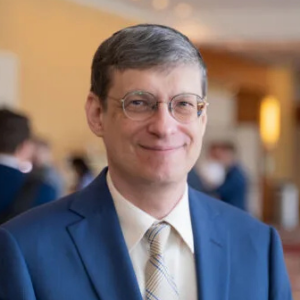
Thursday Aug 07, 2025
Thursday Aug 07, 2025
In this second conversation with political philosopher Yoram Hazony, we dive deeper into the biblical concept of nationhood, wrestling with listener-submitted questions on nationalism, empire, and political virtue. Hazony responds to critiques and clarifies his position: biblical nationalism is not about racial purity or imperialism, but about the virtue of limited, self-governing peoples—unified not by ethnicity but by shared laws, traditions, and faith.
Hazony distinguishes biblical terms like am and goy, explores the status of converts like Ruth, and dismantles the modern racialized understanding of nationhood. He emphasizes that scripture assumes nations will be internally diverse, but not infinitely so—there must be a dominant center that holds people together.
The conversation also explores why biblical literature, not Greco-Roman thought, shaped the American constitutional order, and why the prophets critique empire while affirming the need for some form of the state. As Hazony puts it, “Purity is not the goal. Faithful unity is.”
For the Harvard Journal of Law and Public Policy article Yoram mentioned in the interview, access the PDF here:https://journals.law.harvard.edu/jlpp/wp-content/uploads/sites/90/2025/06/Hammer-FINAL_TC-JH-YRH-edits.pdf
For more of Yoram's literature:https://www.yoramhazony.org/https://x.com/yhazony
We are listener supported. Give to the cause here:https://hebraicthought.org/give
For more articles:https://thebiblicalmind.org/
Social Links:Facebook: https://www.facebook.com/HebraicThoughtInstagram: https://www.instagram.com/hebraicthoughtThreads: https://www.threads.net/hebraicthoughtX: https://www.twitter.com/HebraicThoughtBluesky: https://bsky.app/profile/hebraicthought.org
Chapters:
00:00 The Virtue of Nationalism05:19 Understanding Nation in Biblical Context10:42 The Role of Genetics and Kinship in Nations15:25 Diversity and Unity in National Identity20:09 Power Dynamics in Heterogeneous Nations25:23 Biblical Foundations of Western Political Thought38:14 The Christian Heritage of the West41:15 Separation of Powers and the Mosaic Constitution44:37 Separation of Church and State48:29 The Concept of Empire59:00 The Role of Kings and the State01:00:17 Eschatology and the Future of Nations

Thursday Jul 31, 2025
Thursday Jul 31, 2025
Should Christians serve in the military? In this sobering and nuanced episode, Dru Johnson sits down with retired Colonel Darren Duke—Marine Corps Special Operations commander and intelligence officer—to unpack this deeply personal and morally complex question. Drawing from over 30 years of military experience, Duke shares his evolving view of military service, from Cold War patriotism to the hard-earned disillusionment of post-9/11 combat.
He offers insight into how symbols like the Punisher, Spartan helmets, and Valhalla became coping mechanisms for troops struggling with the trauma and moral ambiguity of prolonged warfare. Duke also warns young Christians to prepare not only for the battlefield but for the morally challenging culture within the military itself.
This conversation does not prescribe easy answers but outlines how one might think Christianly about enlistment, national service, and the weight of violence in a fallen world. Listeners will walk away better equipped to consider military service with sober realism, moral clarity, and theological depth.
We are listener supported. Give to the cause here:https://hebraicthought.org/give
For more articles:https://thebiblicalmind.org/
Social Links:Facebook: https://www.facebook.com/HebraicThoughtInstagram: https://www.instagram.com/hebraicthoughtThreads: https://www.threads.net/hebraicthoughtX: https://www.twitter.com/HebraicThoughtBluesky: https://bsky.app/profile/hebraicthought.org
Chapters:
00:00 Introduction to Military Service and Personal Background09:54 Reflections on Military Service and Christian Identity17:52 The Complexity of War and Its Justifications20:13 The Weight of War: Moral Trauma and Reflection22:12 Existential Questions in Military Service24:26 Navigating Morality in Combat28:12 The Christian Perspective on Military Service32:27 Defending the Defenseless: A Moral Duty35:32 The Role of Leadership in Military Ethics

Thursday Jul 24, 2025
Thursday Jul 24, 2025
In this update episode, Dru Johnson and Mike Tolliver pull back the curtain on the work happening at the Center for Hebraic Thought. From filing 501(c)(3) nonprofit status and building a stellar advisory board, to launching a redesigned website and reviving in-person workshops, the CHT has been quietly preparing for long-term growth and broader influence.
They discuss the newly relaunched Hebraic Thought Community (HTC) on Facebook—already hundreds strong—and the four activities that bring the community together: highlighting member-created resources, sharing weekend reading, gathering weekly for public listening of Scripture, and hosting scholar Q&As. This digital community is sparking cross-disciplinary conversations, surfacing unexpected gems from laypeople, and reimagining how Christians listen to the Bible together.
Dru and Mike also explain why listening (not just reading) Scripture in community is a powerful and ancient discipline—and why it’s missing from most churches today. They reflect on the joy of watching Scripture come alive in unexpected ways through these communal practices.
They close with a call to support: whether through recurring giving, hosting a workshop, or sharing the word, CHT is building something bigger than any one person—something rooted in Scripture and flourishing in community.
We are listener supported. Give to the cause here:https://hebraicthought.org/give
For more articles:https://thebiblicalmind.org/
Social Links:Facebook: https://www.facebook.com/HebraicThoughtInstagram: https://www.instagram.com/hebraicthoughtThreads: https://www.threads.net/hebraicthoughtX: https://www.twitter.com/HebraicThoughtBluesky: https://bsky.app/profile/hebraicthought.org
Chapters:
00:00 Introduction 00:03 Updates on The Center for Hebraic Thought 03:03 Community Engagement and Workshops 06:03 Hebraic Thought Community Initiatives 09:04 Public Listening of Scripture 11:55 The Importance of Listening to Scripture 15:10 Website Updates and Future Plans 17:53 Funding and Support for the Center 20:58 Workshops and Community Involvement
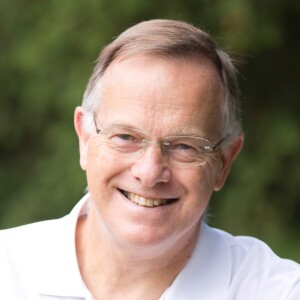
Thursday Jul 17, 2025
Thursday Jul 17, 2025
Should Christians look for Jesus in every verse of the Old Testament—or are we missing the point when we do?
In this wide-ranging and practical conversation, Dr. Christopher J. H. Wright, Langham Partnership’s Global Ambassador and one of the world’s leading Old Testament scholars, joins Dru Johnson to explore the difference between Christocentric and Christotelic readings of Scripture. Wright reflects on common instincts Christians have—either skipping the Old Testament or trying to make every text about Jesus—and explains what we lose when we fail to respect the voice and context of the original authors.
Wright argues for a more faithful reading that respects the historical drama of God’s covenantal journey with Israel, leading to but not eclipsed by Christ. He explains how Luke 24 affirms that the Scriptures point to Jesus, but that doesn’t mean every verse must be “about” him. Instead, Scripture forms a unified story with Jesus as its destination, not its hiding place.
The conversation ends with a powerful case for why the global church, especially in the majority world, has crucial theological insights to offer—and why Western Christians should be ready to learn.
For more from Chris Wright:
https://christopherjhwright.com/
For more about Langham Partnership:
https://us.langham.org/
We are listener supported. Give to the cause here:https://hebraicthought.org/give
For more articles:https://thebiblicalmind.org/
Social Links:Facebook: https://www.facebook.com/HebraicThoughtInstagram: https://www.instagram.com/hebraicthoughtThreads: https://www.threads.net/hebraicthoughtX: https://www.twitter.com/HebraicThoughtBluesky: https://bsky.app/profile/hebraicthought.org
Chapters:
00:00 Understanding the Old Testament's Relevance02:01 Challenges in Interpreting the Old Testament05:26 The Importance of Context in Biblical Interpretation08:09 The Role of Jesus in Old Testament Texts11:00 Exegetical Approaches to the Old Testament14:08 The Historical Unfolding of God's Promises21:06 The Transition from Law to Grace22:32 The Journey of Scripture Towards Christ24:57 Understanding the Role of the Gospels and Acts27:00 The Nature of Biblical Narrative29:01 Langham Partnership: Resourcing Global Churches32:37 The Importance of Preaching in the Majority World36:00 Listening to Global Voices in Theology
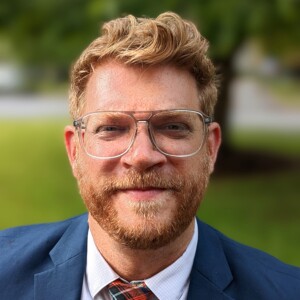
Thursday Jul 10, 2025
Thursday Jul 10, 2025
What if the most politically influential Christian leaders in America aren’t the ones you’ve heard of?
In this eye-opening conversation, Dr. Matthew D. Taylor joins Dru Johnson to explain how the New Apostolic Reformation (NAR) and related charismatic networks reshaped modern evangelicalism—and helped deliver the presidency to Donald Trump. Taylor, a scholar of religion and politics, traces how televangelists, prophets, and apostolic leaders operating outside denominational structures built a new Christian populist movement with real spiritual and political power.
Far from being fringe actors, these leaders—like Paula White and Lance Wallnau—hold enormous sway through media networks and prophetic authority. Taylor explores how modern prophecy, celebrity culture, and populist theology have created a system resistant to critique, driven by revival language and unregulated influence. He explains why evangelical elites misjudged the NAR’s reach and how their dismissal of these leaders as “hucksters” only deepened the divide.
We are listener supported. Give to the cause here:https://hebraicthought.org/give
For more articles:https://thebiblicalmind.org/
Social Links:Facebook: https://www.facebook.com/HebraicThoughtInstagram: https://www.instagram.com/hebraicthoughtThreads: https://www.threads.net/hebraicthoughtX: https://www.twitter.com/HebraicThoughtBluesky: https://bsky.app/profile/hebraicthought.org
Chapters:
00:00 Introduction to the New Apostolic Reformation Movement02:50 Understanding Pushback and Misconceptions05:46 Defining the New Apostolic Reformation09:21 The Role of Charismatic Leaders in Politics12:10 Trump and the Evangelical Connection15:09 The Seven Mountain Mandate and Its Implications18:05 Cyrus Prophecy and Its Significance21:14 The Divide Between Evangelical Elites and Grassroots26:19 Theological Divides in Modern Evangelicalism27:40 Historical Context of Evangelicalism29:06 Populism and the Rise of Trump31:29 Scriptural Interpretation and Prophecy35:19 The Role of Modern Prophecy38:33 Leadership Dynamics in Non-Denominational Spaces43:41 Christian Nationalism vs. Christian Supremacy46:35 The Early Church's Ethos vs. Modern Power50:58 Path Forward for Evangelicals
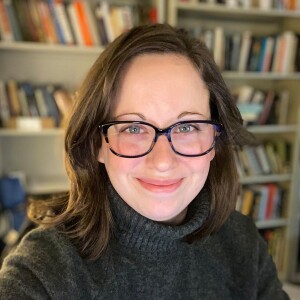
Thursday Jul 03, 2025
Thursday Jul 03, 2025
What do Hollywood, Joan Didion, and the Bible have in common?
More than you’d expect. In this episode, New York Times film critic and author Alissa Wilkinson joins Dru Johnson to discuss the life, work, and worldview of Joan Didion, one of the most influential American writers of the 20th century. Wilkinson’s new book, We Tell Ourselves Stories, explores how Didion made sense of chaos through narrative—and what her work reveals about faith, trauma, politics, and cultural memory.
Together, Alissa and Dru explore Didion’s insight that stories are not just entertainment; they are survival mechanisms, tools we use to impose order on a chaotic world. But is that all Scripture is—just another human-made narrative? Wilkinson offers a careful reflection on the limits and power of storytelling, showing how Didion’s work can challenge both Christian belief and secular mythmaking.
They also dive into conspiracy theories, the fusion of politics and Hollywood, and the rise of nostalgia as a cultural sickness. From John Wayne to 9/11 to the Marvel Cinematic Universe, this episode traces the invisible threads between the stories we inherit and the truths we cling to.
We are listener supported. Give to the cause here:https://hebraicthought.org/give
For more articles:https://thebiblicalmind.org/
Social Links:Facebook: https://www.facebook.com/HebraicThoughtInstagram: https://www.instagram.com/hebraicthoughtThreads: https://www.threads.net/hebraicthoughtX: https://www.twitter.com/HebraicThoughtBluesky: https://bsky.app/profile/hebraicthought.org
Chapters:
00:00 Exploring Joan Didion's Influence02:10 The Chaos of Life and Storytelling05:08 The Impact of California on Didion's Work08:15 Didion's Perspective on Conspiracy Theories11:24 Hollywood's Political Landscape and Didion's Critique14:26 The Intersection of Politics and Entertainment17:29 Didion's Views on Feminism and Fixed Ideas20:26 The Role of Nostalgia in Storytelling23:24 The Modern Political Narrative26:17 Conspiracies and Their Impact on Society29:27 The Nature of Truth in Storytelling32:10 Didion's Legacy in Film and Media35:20 The Future of Storytelling in Politics
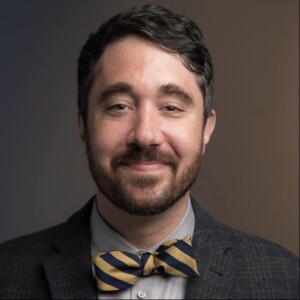
Thursday Jun 26, 2025
Thursday Jun 26, 2025
Was wine in the Bible just a calorie source—or something far richer? In this fascinating conversation, Dr. John Anthony Dunne, author of The Mountain Shall Drip Sweet Wine: A Biblical Theology of Alcohol, joins Dru Johnson to explore how wine and alcohol shaped ancient Israel’s culture, theology, and imagination.
Dr. Dunne traces how biblical wine reflected not only the scarcity and agricultural hopes of ancient life, but also a tradition of craftsmanship, connoisseurship, and divine blessing. Together they unpack why biblical wine wasn’t just functional—it was symbolic of abundance, peace, and God’s favor.
From fermentation methods and ancient storage to the surprising case for white wine at the wedding at Cana, this episode challenges modern assumptions about alcohol in Scripture. Dunne explores why the biblical world viewed wine as inherently miraculous, why production was tied to the land promise, and how modern communion links us to Canaan’s terroir in unexpected ways.
We are listener supported. Give to the cause here:https://hebraicthought.org/give
For more articles:https://thebiblicalmind.org/
Social Links:Facebook: https://www.facebook.com/HebraicThoughtInstagram: https://www.instagram.com/hebraicthoughtThreads: https://www.threads.net/hebraicthoughtX: https://www.twitter.com/HebraicThoughtBluesky: https://bsky.app/profile/hebraicthought.org
Chapters:
00:00 Introduction00:42 Christianity and Alcohol02:52 Cultural Perspectives on Alcohol Consumption06:01 Theological Implications of Alcohol in Scripture08:58 Wine Production and Its Significance12:00 The Craft of Winemaking in Ancient Times14:57 Grapes: Beyond Wine Production18:06 Environmental Factors in Viticulture20:58 The Symbolism of Wine in Biblical Texts22:06 The Importance of Climate in Winemaking25:11 Exploring Ancient Grape Varieties27:07 The Fermentation Process of Ancient Wines35:04 The Significance of Jesus' First Miracle45:10 Wine as a Connection to the Land

Thursday Jun 19, 2025
Thursday Jun 19, 2025
Is nationalism always bad—or does the Bible have a more nuanced view of nations, borders, and political life? In this fascinating episode, Israeli philosopher Yoram Hazony joins Dru Johnson to explore the political vision of the Old Testament, from the Table of Nations in Genesis to the prophetic hope of nations learning from Israel in peace.
Hazony explains how the Bible’s anti-empire stance emerges from the stories of Babel, Assyria, and Babylon—and why God’s vision for humanity includes independent nations with borders, traditions, and space to seek Him freely. Together they unpack how Israel’s kingship, laws, and tribal structure offer a model of checks, balances, and moral limits on power.
The conversation also tackles modern questions: What can Christians today learn from biblical nationalism? How does this compare with movements like Christian nationalism in the U.S.? And why does Hazony see so many modern Christian intellectuals missing the Old Testament’s political teachings?
For more of Yoram's literature:https://www.yoramhazony.org/https://x.com/yhazony
We are listener supported. Give to the cause here:https://hebraicthought.org/give
For more articles:https://thebiblicalmind.org/
Social Links:Facebook: https://www.facebook.com/HebraicThoughtInstagram: https://www.instagram.com/hebraicthoughtThreads: https://www.threads.net/hebraicthoughtX: https://www.twitter.com/HebraicThoughtBluesky: https://bsky.app/profile/hebraicthought.org
Chapters:
00:00 Introduction to Nationalism and the Bible00:56 Biblical Foundations of National Identity09:32 Political Philosophy in the Old Testament12:43 Critiques of Nationalism in the Hebrew Bible20:42 The Nature of Sin and Human Corruption22:40 Nationalism and the Biblical Perspective26:08 Borders and National Independence40:01 Governance and the Role of Law45:28 Christian Nationalism: Perspectives and Concerns
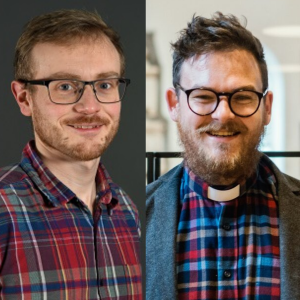
Thursday Jun 12, 2025
Thursday Jun 12, 2025
Is church just a place to think about God—or are we wired to worship together? In this groundbreaking episode, theologian Dr. Josh Cockayne and developmental psychologist Dr. Gideon Salter join Dru Johnson to explore how human beings are made for joint attention, and why gathering for worship is a deeply embodied, social necessity.
Drawing from their book Why We Gather, the conversation unfolds how infants develop the skill of “joint attention”—the ability to notice something with someone else—and how this same capacity is essential to biblical worship, from Genesis to Revelation. They argue that worship isn’t merely cognitive or emotional—it’s communal, embodied, and neurologically formative. Togetherness isn’t a nice-to-have; it’s the foundation of how we know God and the world.
From communion rituals and infant behavior to liturgical design and online church, the episode provides a practical, psychologically grounded, and theologically rich vision of church that challenges both individualism and shallow expressions of “community.”
For their book "Why We Gather," see the publisher's website here:
https://www.baylorpress.com/9781481322911/why-we-gather/
We are listener supported. Give to the cause here:https://hebraicthought.org/give
For more articles:https://thebiblicalmind.org/
Social Links:Facebook: https://www.facebook.com/HebraicThoughtInstagram: https://www.instagram.com/hebraicthoughtThreads: https://www.threads.net/hebraicthoughtX: https://www.twitter.com/HebraicThoughtBluesky: https://bsky.app/profile/hebraicthought.org
Chapters:
00:00 Introduction to Worship and Individual Experience02:59 The Role of the Body in Worship06:02 Joint Attention and Its Importance09:20 The Collaboration Between Psychology and Theology12:12 Understanding Joint Attention in Worship15:17 The Impact of Joint Attention on Community Worship18:05 Liturgy and Joint Attention in Practice21:09 Theological Implications of Joint Attention24:04 Cultural Jointness and Worship27:06 Conclusion and Reflections on Worship27:42 Children's Participation in Church28:42 Exploring Joint Attention in Liturgical Settings30:57 The Role of Community in Worship32:36 Understanding Jointness and Joint Attention35:12 The Dynamics of Participation in Worship36:18 Theological Perspectives on Joint Attention38:12 The Biological and Social Aspects of Gathering41:44 Critiques of Theoretical Frameworks in Worship
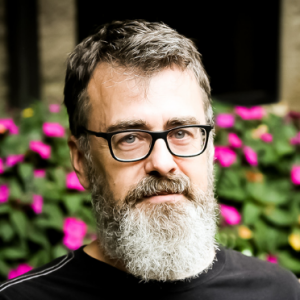
Thursday Jun 05, 2025
Thursday Jun 05, 2025
What gives someone the right to script your prayers? In this powerful conversation, Douglas McKelvey, author of the bestselling Every Moment Holy liturgical series, joins Dru Johnson to unpack the spiritual and theological journey behind his work. From a childhood steeped in neo-charismatic theology to a disillusioning college experience at Oral Roberts University, McKelvey shares how God used a profound unraveling—what many today might call “deconstruction”—to rebuild a biblically coherent faith through unexpected mentors and communities.
Listeners learn how McKelvey became part of the Art House Foundation and later the Rabbit Room, drawing from the legacies of Francis Schaeffer, Edith Schaeffer, and Andrew Peterson to create a community of artists grounded in Scripture. Along the way, he opens up about the fear and trembling that should attend writing liturgies—and what it means to write prayers people will carry into their most vulnerable moments.
This episode explores beauty, hospitality, ritual, and the theological integrity behind the words we say to God. Whether you're a liturgy lover, creative, or just someone seeking coherent theology after chaos, this is an episode that will stay with you.
Learn more about the Art House and Rabbit Room here:https://www.arthousenashville.com/our-storyhttps://www.rabbitroom.com/
We are listener supported. Give to the cause here:https://hebraicthought.org/give
For more articles:https://thebiblicalmind.org/
Social Links:Facebook: https://www.facebook.com/HebraicThoughtInstagram: https://www.instagram.com/hebraicthoughtThreads: https://www.threads.net/hebraicthoughtX: https://www.twitter.com/HebraicThoughtBluesky: https://bsky.app/profile/hebraicthought.org
Chapters:
00:00 Introduction to the Rabbit Room02:22 The Evolution of the Rabbit Room05:17 Community and Connection in the Rabbit Room08:29 The Significance of Northwind Manor11:31 Personal Journey and Theological Foundations14:10 Navigating Doubt and Deconstruction23:08 Charlie Peacock and the Art House Foundation26:29 The Art House and Its Influence31:04 The Physical Space of the Art House34:20 Theological Foundations for Artists36:33 Every Moment Holy: A Journey of Prayer43:13 The Impact of Ritual in Prayer50:43 Reflections on the Craft of Prayer52:18 The Rabbit Room: A Hub for Creativity






